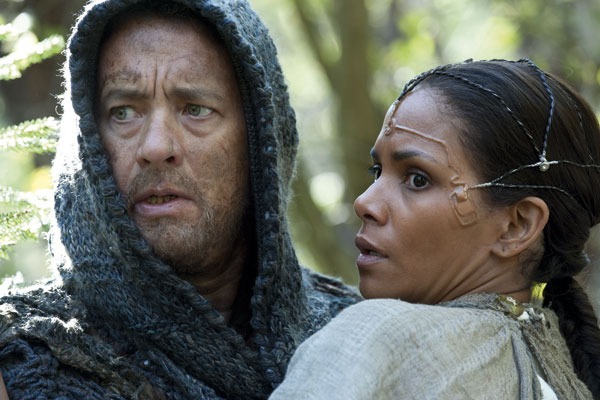Cloud Atlas is part-sci-fi, part-thriller, part-romance, part-comedy, part-action flick, part-this, part-that and it all adds up to? A whole lot of not very much. Based on David Mitchell’s novel, this strains, laboriously, to capture that novel’s scope and complexity, but gets nowhere near, and takes three hours to get nowhere near. (If you are going to take three hours, you can’t get somewhere, at least? Is that too much to ask?)
Its problem isn’t lack of ambition. This cost $100 million, had three directors and stars multiple A-listers in multiple roles in multiple storylines. These A-listers include Tom Hanks, Halle Berry, Susan Sarandon, Jim Broadbent, Jim Sturgess, Ben Whishaw and Hugh Grant, who adopts a variety of guises, and is still noticeably Hugh Grant, which has to be his gift to the world. And its message, that love lives on and all souls return and renew their bonds with each other in endless cycles of recurrence? I’m minded to think this is simply banal karmic humbug but, just in case, have put my name down for reincarnation. However, I’m not hopeful as I hear that, these days, you have to know a lot about computers to be accepted. Is this true? Do you know?
OK, directed by Lana and Andy Wachowski (the siblings behind the Matrix trilogy) and Tom Tykwer (Run Lola Run), this follows six separate stories set in the past, present and future, and, unlike the book, where each story nests within the next, this cuts them thin and intertwines and entangles them, like wool at the bottom of the knitting basket. And now, because I am lazy, and it is always simpler to list than to explain, I will list these stories here:
•In 1849, a young American lawyer (Sturgess) makes a journey to a Pacific island where slavery still holds sway and where he falls foul of a scheming doctor.
•In 1956, a young English gay composer (Whishaw) is hired as an amanuensis to a tyrannical older composer (Broadbent).
•In 1973, a journalist (Berry) puts her life in danger when she gets a whiff of a scandal involving nuclear power.
•In 2010, a pompous, unscrupulous publisher (Broadbent) is imprisoned in a retirement home by his brother.
•In an Asian city in 2014 a fabricant (Doona Bae), cloned to work in the food industry, discovers consciousness and falls in love.
•In the 23rd century, a small tribe living in a post-apocalyptic forest are hounded by body-painted slavering cannibals as they are visited by their superiors.
I could now tell you all the ways the stories intersect, or how one refers to another from within itself, or how a particular detail — a birthmark, say — keeps recurring, as do the actors, who take on different roles and noses. (Hanks plays six roles and has a different nose for each.) But I’m too lazy for that, too. Instead, I feel I ought to alert you to some fairly weird prosthetics. I’ve seen some strange things at the cinema in my time and now, I suppose, I will have to count among them poor Mr Sturgess, with eyes remodelled to make him look Asian, and Halle Berry donning a white skin, and Hugh Grant as a body-painted, slavering cannibal, although, true to his gift to the world, he is still always noticeably Hugh Grant. And, also, I feel I ought to alert you to the performances, which are wildly uneven, ranging from hammy (Broadbent) through to utterly listless (Berry and Sarandon) and cringe-inducing (Hanks as a shaman, Grant as a curly-haired cockney).
But the weirdest thing is, for a film about recurring connections, how disconnected it all feels. It is disconnected in tone. The retirement scenario, for example, is broadly played as comedy whereas the futuristic strands are played with a horrible and turgid earnestness. And the stories themselves never feel connected, never come together as the one big story. So it’s a cold and distanced and, yes, rather boring experience during which we feel nothing for any of the characters. It is three hours without actually getting anywhere near the place it should have got to. And imagine if National Express did that. It would go bust.





Comments